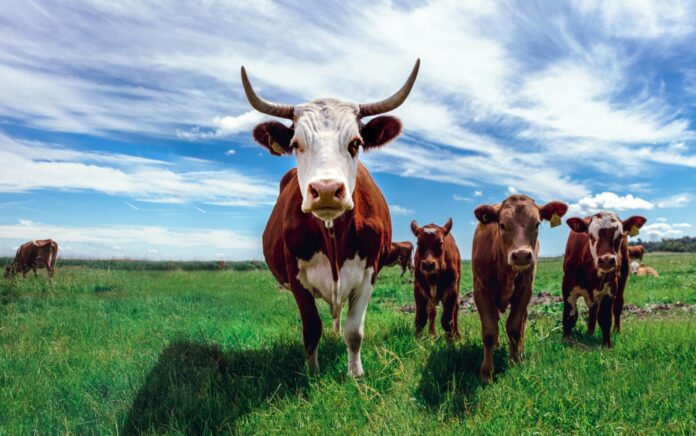The US cattle industry is going blockchain. Decentralized cow verification service, CattleProof’s “Verified,” has been approved, giving it the historic title as the United States Department of Agriculture’s very first blockchain-based Process Verified Program (PVP). CattleProof is a Wyoming company that uses the distributed ledger technology to store individual cow’s data.
Blockchain For Livestock Verification
The electronic identification tags attached to each animal provide a combination of data, noting the animal’s condition, location, and many other attributes, which are then stored immutably on a blockchain. This change dramatically makes tracking easier with farm-to-fork traceability also enabling farmers to observe the health of the animals in real time for better care and monitoring of their cattle.
One Big Step Towards Regulation
The PVP service of the USDA could enable firms like CattleProof to set as a standard in regulatory requirements while launching innovation for cattle-related problems. It would allow companies like CattleProof to put together a set of voluntary standards that would be reviewed by the government, thus being the first decentralized network for cattle monitoring.
As of today, the market cap of cryptocurrencies stood at $2.14 trillion. Chart: TradingView.com
It fits into a broader pattern in the agriculture industry where industry participants increasingly look at technology as a way of adjusting to regulatory requirements while improving efficiency and transparency in their operations.
CattleProof: A Unique Solution
What makes CattleProof unique is that it is a USDA-approved PVP using blockchain. Services include being certified with “Born in the USA” as well as digital certificates with backlinks directly to the animal data. The company is also integrated with Heartland Payments, which presents the opportunity for direct transactions of verified cattle.
This is established by giving buyers the opportunity to verify their livestock’s authenticity and ultimately improve consumer confidence in meat products transactions. Furthermore, the system allows farmers to offer something unique about their produce, in a competitive market-place the traceability and ethical sourcing to consumers can give them the edge among competitors.
The approval also is proof that farm adoption of blockchain technology is gaining momentum. The recent proposal that was made by the USDA- to amend the rules on organic products to establish traceable supply lines further adds substance to its growth.
As blockchain continues to gain traction in agriculture, it is poised to transform the farming industry in ways that incorporate enhanced security, reduced fraud, and improved supply chain efficiency. This success may be a precursor to opening various programs up to similar initiatives in other sectors, reinforcing the role that technology will play within modern farming practices.
Featured image from The Whitney Land Company, chart from TradingView
Credit: Source link






















 Bitcoin
Bitcoin  Ethereum
Ethereum  XRP
XRP  Tether
Tether  Solana
Solana  USDC
USDC  Dogecoin
Dogecoin  Cardano
Cardano  Lido Staked Ether
Lido Staked Ether  TRON
TRON  Chainlink
Chainlink  Avalanche
Avalanche  Wrapped Bitcoin
Wrapped Bitcoin  Wrapped stETH
Wrapped stETH  Stellar
Stellar  Sui
Sui  Toncoin
Toncoin  Hedera
Hedera  Shiba Inu
Shiba Inu  WETH
WETH  LEO Token
LEO Token  Litecoin
Litecoin  Polkadot
Polkadot  Bitget Token
Bitget Token  Bitcoin Cash
Bitcoin Cash  Hyperliquid
Hyperliquid  USDS
USDS  Uniswap
Uniswap  Wrapped eETH
Wrapped eETH  Ethena USDe
Ethena USDe  Pepe
Pepe  MANTRA
MANTRA  NEAR Protocol
NEAR Protocol  Aave
Aave  Monero
Monero  Ondo
Ondo  WhiteBIT Coin
WhiteBIT Coin  Aptos
Aptos  Internet Computer
Internet Computer  Official Trump
Official Trump  Mantle
Mantle  Ethereum Classic
Ethereum Classic  Dai
Dai  Cronos
Cronos  POL (ex-MATIC)
POL (ex-MATIC)  Bittensor
Bittensor  OKB
OKB 
